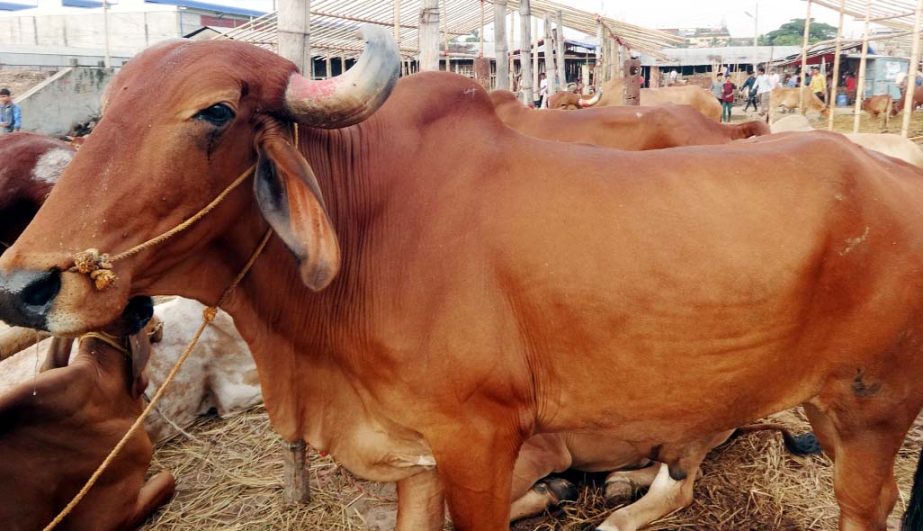
bdnews24.com, Chittagong :
India’s move to plug cattle smuggling will not have much impact on Chittagong market during the Eid-ul-Azha, when the demand for sacrificial animals runs high, local cattle traders and government officials say.
They maintain that the local demand for animals can be met with local bovines.
Only a small number of cows from India and Nepal have been brought to Sagarika, Chittagong’s largest cattle market.
But the sale of sacrificial animals is yet to start ahead of the festival at the end of September.
Last year, Chittagong residents sacrificed 485,876 animals, most of them cows, during the Eid, government figures show.
Chittagong Cattle Traders’ Association General Secretary Kazi Rafiqul Islam said sacrificial animals were yet to be brought to the market.
“Cattle will be brought [here] from various districts and cattle breeders are grooming their animals ahead of the festival,” he said.
“Sale will pick up pace a week before the Eid-ul-Azha.” Islam said he believed there would not be any crisis even if Indian cows did not make it to the market this time.
After Narendra Modi’s conservative BJP took office last year, India has moved to plug the smuggling of cattle to Bangladesh. Cows are considered sacred in Hindu-dominated India.
The step has pushed up meat prices in Bangladesh and put the leather industry in a crunch, as an estimated two million cows are smuggled from India each year.
But Islam was upbeat.
“Cattle breeders and traders know that mostly cows are sold in Chittagong during the Eid-ul-Azha season,” he said. “They will bring in their cattle and I hope there won’t be any crisis.”
But, district livestock officer Md Abdul Hye said the lack of Indian cows in the market will have “some impact”.
He said 217,000 cows and about 150,000 goats were being specially readied for the Eid season by cattle farms and farmers.
An estimated 1.7 million cows are also being kept at farms and homes. He hoped some of these will be sold during the Eid.
He noted that people were less interested in imported cows last year.
“Eighty percent of the cattle sold were locally bred,” he added.
“There will be a slight problem if there’s no [cattle] import,” he said. “We can become self-sufficient in meat production within two years if low-interest loans are given for cattle rearing.”
India’s move to plug cattle smuggling will not have much impact on Chittagong market during the Eid-ul-Azha, when the demand for sacrificial animals runs high, local cattle traders and government officials say.
They maintain that the local demand for animals can be met with local bovines.
Only a small number of cows from India and Nepal have been brought to Sagarika, Chittagong’s largest cattle market.
But the sale of sacrificial animals is yet to start ahead of the festival at the end of September.
Last year, Chittagong residents sacrificed 485,876 animals, most of them cows, during the Eid, government figures show.
Chittagong Cattle Traders’ Association General Secretary Kazi Rafiqul Islam said sacrificial animals were yet to be brought to the market.
“Cattle will be brought [here] from various districts and cattle breeders are grooming their animals ahead of the festival,” he said.
“Sale will pick up pace a week before the Eid-ul-Azha.” Islam said he believed there would not be any crisis even if Indian cows did not make it to the market this time.
After Narendra Modi’s conservative BJP took office last year, India has moved to plug the smuggling of cattle to Bangladesh. Cows are considered sacred in Hindu-dominated India.
The step has pushed up meat prices in Bangladesh and put the leather industry in a crunch, as an estimated two million cows are smuggled from India each year.
But Islam was upbeat.
“Cattle breeders and traders know that mostly cows are sold in Chittagong during the Eid-ul-Azha season,” he said. “They will bring in their cattle and I hope there won’t be any crisis.”
But, district livestock officer Md Abdul Hye said the lack of Indian cows in the market will have “some impact”.
He said 217,000 cows and about 150,000 goats were being specially readied for the Eid season by cattle farms and farmers.
An estimated 1.7 million cows are also being kept at farms and homes. He hoped some of these will be sold during the Eid.
He noted that people were less interested in imported cows last year.
“Eighty percent of the cattle sold were locally bred,” he added.
“There will be a slight problem if there’s no [cattle] import,” he said. “We can become self-sufficient in meat production within two years if low-interest loans are given for cattle rearing.”

